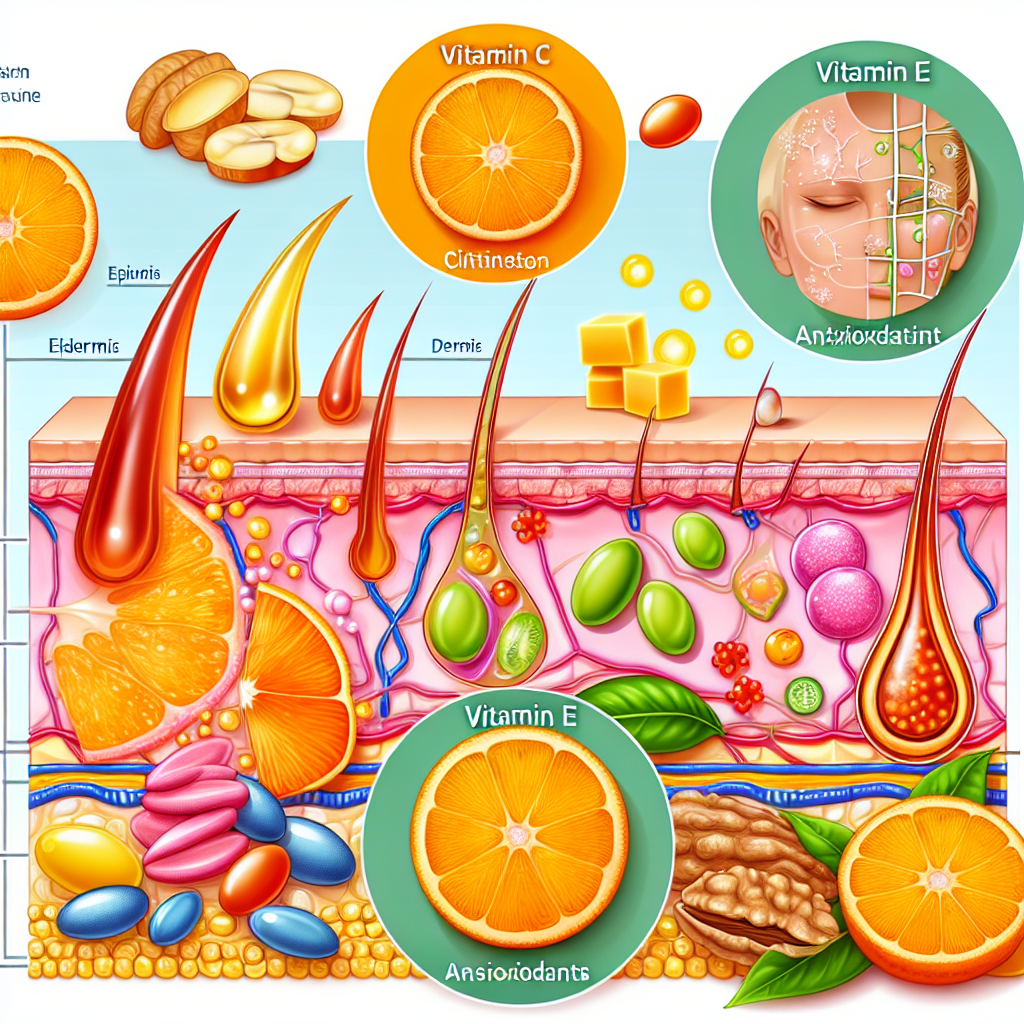How Vitamin C and E Keep Your Skin Glowing

Discover the secret to radiant skin with Vitamins C and E! These essential nutrients not only nourish your skin but also protect it from damage, keeping it glowing and youthful. Don’t wait, learn more about the benefits of these vitamins for your skin today. Click here to start your journey towards vibrant vitality.
The Role of Vitamin C and E in Achieving Radiant Skin
The quest for radiant, glowing skin is a journey that many embark on, but few truly understand. While there are countless skincare products and treatments available in the market, the secret to achieving that coveted glow may lie in something as simple as the vitamins we consume. Specifically, vitamins C and E have been found to play a crucial role in maintaining skin health and promoting a radiant complexion.
Vitamin C, also known as ascorbic acid, is a potent antioxidant that is essential for the growth, development, and repair of all body tissues. It is involved in numerous body functions, including the formation of collagen, absorption of iron, the immune system, wound healing, and the maintenance of cartilage, bones, and teeth. When it comes to skin health, vitamin C is a superstar. It aids in the skin’s natural regeneration process, which helps the body repair damaged skin cells. This means that a regular intake of vitamin C can help to reduce the appearance of wrinkles, fine lines, and other signs of aging.
Moreover, vitamin C has been found to have a brightening effect on the skin. It inhibits the skin’s melanin production, which is what causes skin discoloration like dark spots and hyperpigmentation. With continued topical use, vitamin C can help to fade pigmentation and smooth the skin’s surface to reveal a brighter and more glowing complexion.
On the other hand, vitamin E is a fat-soluble nutrient found in many foods. In the body, it acts as an antioxidant, helping to protect cells from the damage caused by free radicals. Free radicals are compounds formed when our bodies convert the food we eat into energy. People are also exposed to free radicals in the environment from cigarette smoke, air pollution, and ultraviolet (UV) light from the sun. The skin, being the largest organ and the first line of defense against these environmental stressors, benefits greatly from the protective properties of vitamin E.
Vitamin E has been found to absorb UVB light—the nasty spectrum of sunlight that’s responsible for burning and aging the skin. By absorbing this light, vitamin E can help to prevent dark spots and wrinkles. Additionally, when combined with vitamin C, the two vitamins work synergistically to provide a higher level of photoprotection. They also work together to keep the skin hydrated and healthy.
Furthermore, vitamin E is known for its moisturizing properties. It helps to strengthen the skin barrier function, reducing water loss and thereby keeping the skin hydrated and supple. This is particularly beneficial for those with dry skin, as it can help to alleviate dryness and flakiness, leaving the skin looking healthier and more radiant.
In conclusion, vitamins C and E play a crucial role in maintaining skin health and promoting a radiant complexion. They work together to protect the skin from environmental damage, promote skin repair and regeneration, and keep the skin hydrated and supple. So, if you’re on a quest for glowing skin, don’t overlook these essential vitamins. Incorporate them into your diet and skincare routine, and you’ll be well on your way to achieving that coveted glow.
Unlocking the Secrets of Glowing Skin: The Power of Vitamins C and E

Unlocking the secrets of glowing skin is a quest that many embark on, but few truly master. The key, as it turns out, lies not in expensive creams or invasive procedures, but in the humble realm of vitamins. Specifically, vitamins C and E have been found to possess remarkable skin-enhancing properties. These two vitamins, when used correctly, can help you achieve the radiant, healthy skin you’ve always desired.
Vitamin C, also known as ascorbic acid, is a potent antioxidant that plays a crucial role in maintaining skin health. It is essential for the synthesis of collagen, a protein that provides structure and elasticity to the skin. As we age, our skin’s natural collagen production decreases, leading to wrinkles and sagging. By boosting collagen production, vitamin C helps to maintain skin’s firmness and elasticity, thereby reducing the appearance of aging.
Moreover, vitamin C has been shown to mitigate the damage caused by harmful ultraviolet (UV) radiation. Exposure to UV light generates free radicals, unstable molecules that can damage the skin cells. Vitamin C neutralizes these free radicals, preventing them from causing harm. This protective effect is particularly beneficial for those who spend a lot of time in the sun, as it can help to prevent sunburn and reduce the risk of skin cancer.
In addition to its protective properties, vitamin C also has a brightening effect on the skin. It inhibits the enzyme responsible for melanin production, the pigment that gives skin its color. By reducing melanin production, vitamin C can help to fade dark spots and even out skin tone, resulting in a brighter, more radiant complexion.
Like vitamin C, vitamin E is also a powerful antioxidant. It works in synergy with vitamin C, enhancing its antioxidant effects and helping to stabilize it, thereby increasing its effectiveness. Vitamin E is particularly effective at combating the effects of UV radiation. It absorbs the harmful UV light, preventing it from penetrating the skin and causing damage. This protective effect is especially important for those with sensitive skin, as it can help to prevent sunburn and reduce the risk of skin cancer.
Vitamin E also has moisturizing properties. It helps to strengthen the skin’s barrier function, preventing moisture loss and keeping the skin hydrated. This is particularly beneficial for those with dry skin, as it can help to alleviate dryness and flaking. Moreover, by keeping the skin hydrated, vitamin E can help to smooth out fine lines and wrinkles, giving the skin a more youthful appearance.
In conclusion, vitamins C and E are powerful allies in the quest for glowing skin. They work together to protect the skin from damage, boost collagen production, and keep the skin hydrated. By incorporating these vitamins into your skincare routine, you can achieve the radiant, healthy skin you’ve always desired. However, it’s important to remember that while these vitamins can significantly improve skin health, they are not a substitute for a healthy lifestyle. Regular exercise, a balanced diet, and adequate sleep are also crucial for maintaining healthy, glowing skin.
How Vitamins C and E Contribute to a Healthy, Glowing Complexion
Vitamin C and E are two essential nutrients that play a significant role in maintaining a healthy, glowing complexion. These vitamins are potent antioxidants that protect the skin from harmful free radicals, promote collagen production, and help to repair damaged skin cells. They are the secret ingredients to achieving a radiant, youthful appearance.
Vitamin C, also known as ascorbic acid, is a water-soluble vitamin that is crucial for skin health. It is a powerful antioxidant that neutralizes harmful free radicals, unstable molecules that can damage the skin cells and accelerate the aging process. By neutralizing these free radicals, vitamin C helps to prevent premature aging and maintain a youthful appearance.
Moreover, vitamin C plays a vital role in collagen synthesis, a protein that provides structure and elasticity to the skin. As we age, our body’s collagen production decreases, leading to wrinkles and sagging skin. However, by boosting collagen production, vitamin C helps to maintain the skin’s elasticity and firmness, reducing the appearance of fine lines and wrinkles.
Vitamin C also has brightening properties that can help to fade hyperpigmentation and dark spots, resulting in a more even skin tone. It inhibits the enzyme tyrosinase, which is responsible for melanin production, the pigment that gives skin its color. By inhibiting this enzyme, vitamin C can help to lighten dark spots and improve skin tone, giving the skin a radiant glow.
On the other hand, vitamin E, also known as tocopherol, is a fat-soluble vitamin that is also essential for skin health. Like vitamin C, it is a potent antioxidant that protects the skin from free radical damage. However, vitamin E’s antioxidant properties are particularly effective in protecting the skin from UV damage. By absorbing the harmful UV rays, vitamin E helps to prevent sunburn and reduce the risk of skin cancer.
Vitamin E also has moisturizing properties that help to keep the skin hydrated and prevent dryness. It strengthens the skin’s barrier function, reducing water loss and keeping the skin moisturized. This results in a smoother, softer complexion.
Moreover, vitamin E has anti-inflammatory properties that can help to soothe irritated skin and reduce redness. It also aids in the healing process of the skin, making it beneficial for treating sunburns, scars, and other skin injuries.
When used together, vitamins C and E can provide even more benefits for the skin. They work synergistically to enhance each other’s antioxidant properties, providing more comprehensive protection against free radical damage. This combination can also enhance the effectiveness of sunscreen, providing additional protection against harmful UV rays.
In conclusion, vitamins C and E are essential for maintaining a healthy, glowing complexion. They protect the skin from free radical and UV damage, boost collagen production, and help to repair damaged skin cells. By incorporating these vitamins into your skincare routine, you can achieve a radiant, youthful appearance.